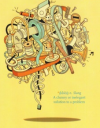New Cognitive Bias Concerning Weak Evidence
Tuesday, March 22nd, 2011 When we decide, solve a problem or learn something new, a cognitive bias is involved. Sometimes the bias plays a strong role in determining the outcome. Cognitive designers must be aware of the biases at play in an application and then created features and functions to either leverage the bias (e.g. buying lottery tickets) or mitigate the bias (e.g. employee hiring decisions). Over 100+ biases have been cataloged but I am always on the lookout for new ones.
When we decide, solve a problem or learn something new, a cognitive bias is involved. Sometimes the bias plays a strong role in determining the outcome. Cognitive designers must be aware of the biases at play in an application and then created features and functions to either leverage the bias (e.g. buying lottery tickets) or mitigate the bias (e.g. employee hiring decisions). Over 100+ biases have been cataloged but I am always on the lookout for new ones.
For example, researchers at Brown University have a few studies that suggest we reason illogically when presented with weak evidence. They found:
We tend to except predictions with no evidence more readily than we do predictions that have weak supporting evidence.
 Said another way, we tend to reject predictions with a weak case over those with no case! Normally we expect more evidence to increase the degree of belief. Why does this weak evidence effect work? The researcher suggest:
Said another way, we tend to reject predictions with a weak case over those with no case! Normally we expect more evidence to increase the degree of belief. Why does this weak evidence effect work? The researcher suggest:
“Give people a weak reason and they’ll focus too much on it. Give people no evidence and they’ll supply their own probably more convincing reason to believe that the outcome is likely.”
This has important implications for cognitive designers especially those working on application involving persuasion. For the full article see When Good Evidence Goes Bad.